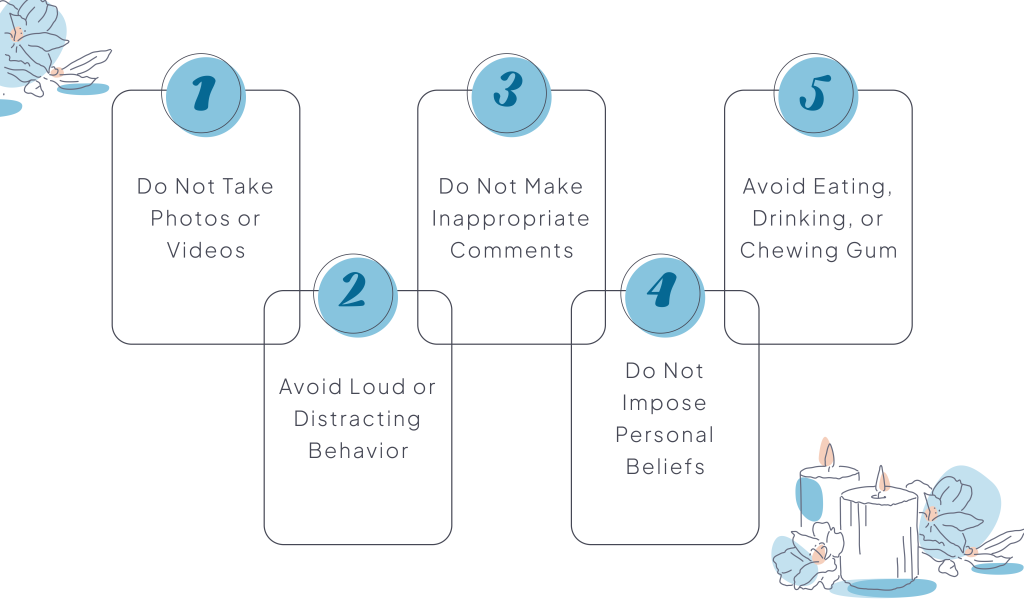
Funerals are a sacred time to remember, reflect, and honor a life. It is a moment for family, friends, and loved ones to come together to pay tribute to the life of the deceased. Christian funerals can appear different depending on the tradition, but they all have a similar goal: to entrust the soul of the departed in God’s care and to provide comfort to the Mourning family. Christian funerals in India have their own set of customs and traditions, and if you’re attending one, it’s important to be mindful of the etiquette.
This blog will guide you through the main Christian funeral customs and how attendees should act, dress, and pay their respects.
Preparing for the Final Farewell
Christian funeral traditions typically begin at home, a church, or a funeral home, where the body is prepared for its final journey.
The Body’s Sanitation and Dressing
To represent purity and peace, the body is bathed and dressed in formal, often in simple clothing. The clergy members ( Religious heads like a priest and ministers) are permitted to wear their religious garments. Across cultures, a rosary or cross is placed in the hands of the deceased as a sign of their faith.
The Wake: A Time for Love, Memories, and Farewell
Before the funeral service, family and friends gather for a wake or viewing,a time to share stories, offer comfort, and say their final goodbyes. It’s a deeply emotional yet meaningful moment.
Candlelight flickers around the coffin, symbolizing Christ’s guiding presence, offering warmth in the midst of sorrow. Loved ones exchange hugs and whisper words of comfort. Hymns fill the room, their melodies carrying both sorrow and hope, reminding everyone that while the person they cherished is gone, their spirit lives on in faith and memory.
The Funeral Service: A Final Goodbye Wrapped in Faith and Love
Gathering– The friends, family and well-wishers of the deceased gather together in a church, funeral home, or cemetery chapel to honor the life of their loved one.
Opening prayer– The priest or pastor starts the prayer in honor of the dead, praying for God’s presence to bring peace and strength to those grieving.
Eulogy- A eulogy is a heartfelt speech shared by a family member or close friend. It is filled with stories, memories, and moments that capture the essence of the departed.
Hymns and Music – Songs of faith and remembrance fill the room, bringing both sorrow and comfort to those present.
Final Blessings – The priest offers a closing prayer, entrusting the soul to God’s care and encouraging hope and healing.
A Quiet Goodbye – Visitors follow the grieving family, standing, sitting, or praying as part of the service.
Mourning and Memorials
The Mourning Period: A Time for Reflection and Remembrance
Mourning is a deeply personal journey, and the duration varies amongst various communities. Some families observe it for a few days, while others follow traditions of 3, 7, or 40 days. During this time, prayers and memorial gatherings provide comfort, allowing loved ones to come together, share stories, and find strength in faith.
The First Memorial Service: Marking 40 Days of Healing
On exactly the 40th day after the funeral, the first memorial service is held. It is believed that by this day, the soul of the deceased has completed its journey to God. Family and friends come together to pray, light candles, and share a meal in remembrance of the departed.
The First Death Anniversary
Just like the Hindu Shraddha ceremony, Christians observe the first anniversary of the death with a special memorial Mass or service. Offerings, prayers, and charitable acts are done in the deceased’s name to honor their memory and seek eternal peace for their soul.
Christian funerals in India vary slightly across communities, such as Catholic, Protestant, Orthodox, and others, yet they share common elements. Christian funerals emphasize dignity and respect. Your presence and behavior should align with this sentiment, so here’s a list of things you should and shouldn’t do when at one.
Funeral Etiquette: Key Things You Should Do
✅ Dress Modestly and Respectfully
Funeral attire should be modest and respectful. Attires in dark colors like black and grey are appreciated. Avoid wearing flashy clothing, and also be mindful when accessorizing. In India, women can wear saree or modest dresses, whereas men can dress in formal or semi-formal clothing.
✅ Follow the Religious Service
While you don’t have to actively participate if you’re from a different faith, standing and observing moments of silence is respectful. If hymns or prayers are being recited, you can quietly follow along or remain silent.

✅ Arrive on Time and Be Mindful of Seating
Funerals are not casual gatherings—arriving late can be disruptive. The front rows are typically reserved for close family members, so choose a seat towards the middle or back unless invited otherwise.
✅ Maintain a Respectful Silence
Kindly ensure your phone is set to silent mode. Christian funerals are all about silence and reflection, so avoid anything and everything that might cause disturbance.
✅ Offer Flowers or a Contribution
In many Christian communities, offering flowers or wreaths is a common gesture of respect. Some families prefer donations to charity in honor of the deceased. It’s always thoughtful to check with the family or follow a common practice.
✅ Offer Condolences Thoughtfully
Expressing sympathy is important, but keep it short. A simple “I’m sorry for your loss” or “My condolences” is enough. A comforting hug or handshake is appropriate if you are close to the family. Avoid emphasizing on their grief or asking painful questions as it will be considered rude.

✅ Be Respectful During the Burial or Cremation
If attending the burial, stand quietly and listen to the final prayers. Avoid taking photos and Maintain complete silence. Avoid any conversations during this time. If it’s a cremation, follow the family’s lead and offer support as needed.
Funeral Etiquette: Key Things You Shouldn’t Do
❌ Do Not Take Photos or Videos
A funeral is not the place for social media updates. Unless specifically asked or permitted by the family, avoid taking pictures or recording the service.
❌ Avoid Loud or Distracting Behavior
This is a time for mourning, not socializing. Keep your voice low, avoid unnecessary movement, if bringing children, ensure they remain quiet and well-behaved throughout the ceremony.
❌ Do Not Make Inappropriate Comments
Even words spoken with good intentions can sometimes hurt. Avoid saying things like “They are in a better place” or “At least they lived a long life” unless you’re sure that the family would appreciate it. Never ask about the cause of death—it’s intrusive and insensitive.
❌ Do Not Impose Personal Beliefs
If you follow a different faith, respect the Christian customs being observed. This is not the time for religious debates or discussions. Simply being present in a respectful manner is enough.
❌ Avoid Eating, Drinking, or Chewing Gum
Unless a meal or gathering follows the service, it’s best to refrain from eating or drinking during the funeral.

Final Thoughts
Attending a Christian funeral in India is about remembering the deceased with decency, respect, and support. You can make sure that your presence is consoling rather than obtrusive by adhering to these key etiquette.
Funerals are tough occasions, but showing a little consideration for the deceased and helping those left behind may make a big difference.